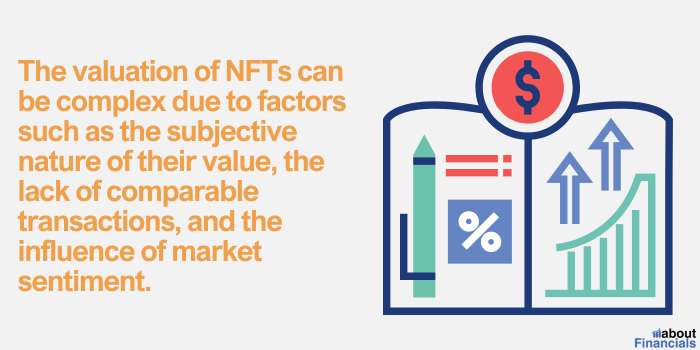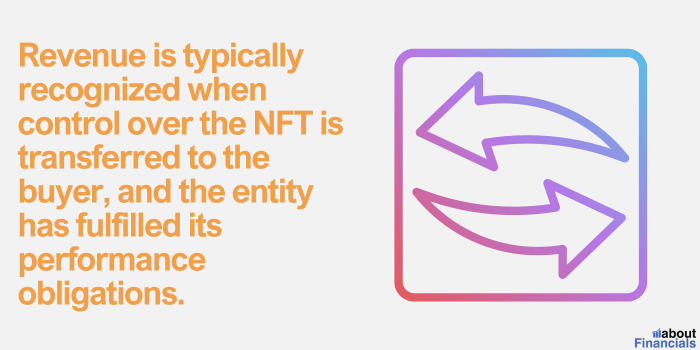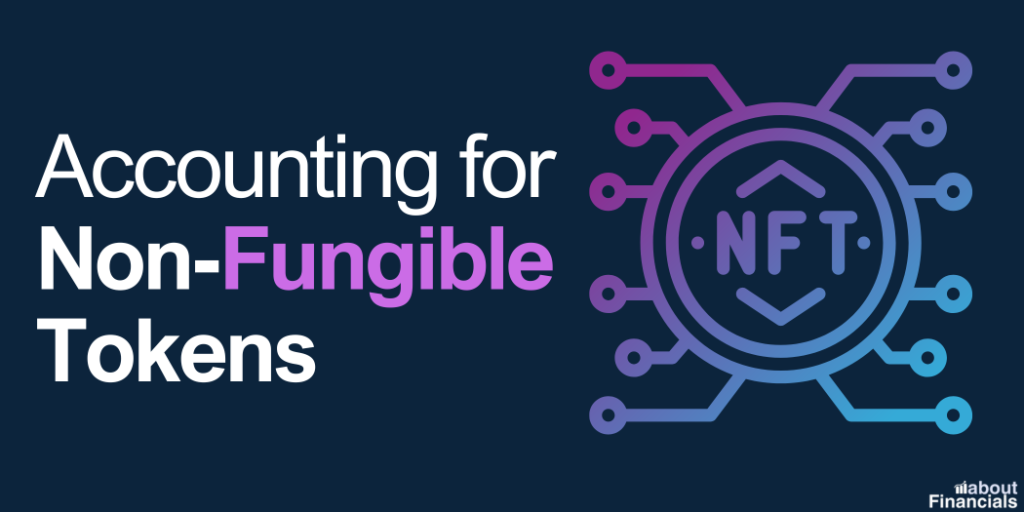NFTs, or Non-Fungible Tokens, have gained significant attention and popularity in recent years.
Unlike traditional assets such as currencies or commodities, NFTs are unique digital assets that are stored on a blockchain, making them indivisible and irreplaceable.
Understanding the accounting treatment for NFTs is crucial as they present new challenges and opportunities in the financial landscape.
NFTs differ from fungible assets like cryptocurrencies in that each NFT has distinct characteristics, ownership history, and metadata associated with it.
This uniqueness is what makes NFTs desirable and valuable. They can represent various forms of digital content, including artwork, collectibles, virtual real estate, and even ownership rights to intellectual property.
As the adoption of NFTs continues to grow, it is important for businesses, individuals, and accounting professionals to have a clear understanding of how these assets should be accounted for in financial statements. Proper accounting treatment ensures accurate reporting, transparency, and compliance with accounting principles and standards.
Accounting for NFT Acquisition
Accounting for the acquisition of NFTs involves recognizing them as intangible assets and determining the appropriate cost to be recorded.
When an entity acquires an NFT, it needs to assess whether the criteria for recognition as an intangible asset are met. This includes determining if the NFT has identifiable characteristics, control over the asset, and the potential to generate future economic benefits.
The cost of acquiring an NFT comprises several components that need to be properly accounted for. This includes the purchase price of the NFT itself, any transaction fees incurred during the acquisition, and any other directly attributable costs. It’s important to carefully document and allocate the costs associated with acquiring NFTs to ensure accurate financial reporting.
Additionally, any other associated costs, such as legal fees or platform fees, should be appropriately accounted for and allocated to the cost of the NFT.
Valuation of NFTs

Valuing NFTs presents unique challenges due to their distinct characteristics and the evolving nature of the market. Here are important considerations when valuing NFTs:
Challenges in Valuing NFTs
The valuation of NFTs can be complex due to factors such as the subjective nature of their value, the lack of comparable transactions, and the influence of market sentiment. Additionally, the value of NFTs may fluctuate significantly over time, making it crucial to determine the appropriate valuation date for financial reporting purposes.
Factors to consider in valuing NFTs
These include the rarity, uniqueness, demand, and historical significance of the digital asset. Additionally, factors such as the reputation of the creator, the quality of the underlying content, and the level of market interest can impact the value. Valuation methodologies may vary based on these factors and the specific characteristics of the NFT being valued.
Different valuation approaches for NFTs
- Market-based approaches involve analyzing recent sales of comparable NFTs, if available.
- Income-based approaches consider the potential future cash flows associated with the NFT, such as royalties or licensing fees.
- Cost-based approaches focus on the cost to create or acquire the NFT. Depending on the circumstances, a combination of these approaches may be appropriate.
NFTs and revenue recognition
Revenue recognition for NFTs involves determining when and how to recognize revenue related to their sale or licensing.

The timing of revenue recognition for NFT sales depends on the nature of the transaction and the applicable accounting standards. If an entity sells an NFT directly to a customer, revenue is typically recognized when control over the NFT is transferred to the buyer, and the entity has fulfilled its performance obligations.
However, if the entity acts as an intermediary in facilitating NFT sales, revenue recognition may differ based on the role played, such as a marketplace operator or consignment seller.
NFTs can be resold multiple times after the initial sale. The accounting treatment for secondary sales depends on whether the entity continues to have involvement or control over the NFT. If the entity has no ongoing involvement or control, revenue recognition may not be appropriate for secondary sales. However, if the entity retains a stake or has rights to future cash flows from the secondary sales, revenue recognition might be necessary.
Presentation and disclosure
NFTs are typically classified as intangible assets and should be presented accordingly in the balance sheet. They may be included within a specific category of intangible assets or separately disclosed, depending on the materiality and significance to the entity’s operations.
Entities should disclose significant accounting policies related to NFTs, including valuation methodologies and any specific risks or uncertainties associated with their fair value determination.
Additional disclosures may include the carrying amount of NFTs, changes in carrying amounts, and any commitments or contingencies related to NFTs.
Accounting for NFTs in different industries
NFTs in the art and creative industry
Accounting for NFTs in this industry involves recognizing the NFTs as assets, valuing them based on factors like artistic merit and reputation, and considering revenue recognition from primary and secondary sales. Additionally, royalty arrangements and licensing fees may play a significant role in revenue recognition.
NFTs in the gaming and entertainment industry
Accounting for NFTs in gaming involves recognizing them as intangible assets, determining their fair value based on their utility and demand, and considering revenue recognition from NFT sales and related royalties.
Implications of Accounting Standards (IFRS, GAAP) on NFTs
Existing accounting standards, such as International Financial Reporting Standards (IFRS) and Generally Accepted Accounting Principles (GAAP), provide guidance for various accounting aspects.
However, applying these standards to NFTs may require careful interpretation and judgment due to the unique nature of these assets. It is essential to stay updated on any specific guidance or interpretations issued by standard-setting bodies or regulatory authorities.
Accounting for NFTs is an area that is likely to undergo further scrutiny and refinement as the market matures and stakeholders seek clarity and consistency. It is crucial for accounting professionals and entities involved in NFT transactions to remain proactive, continuously educate themselves, and adapt their accounting practices to align with regulatory requirements and best practices.
Accounting for NFTs – FAQs
How are companies currently accounting for NFTs?
Companies typically account for NFTs as intangible assets, recognizing them at cost or fair value and disclosing relevant information in their financial statements.
What asset class are NFTs?
NFTs are considered a subset of intangible assets, specifically digital assets with unique characteristics and ownership recorded on a blockchain.
What is an NFT in accounting?
In accounting, an NFT refers to a non-fungible token, which represents a unique digital asset. It requires appropriate recognition, valuation, and disclosure in financial statements.
Are NFTs considered intangible assets?
Yes, NFTs are generally classified as intangible assets since they lack physical substance and represent ownership or rights to digital content.
Are profits from NFTs taxable?
Profits from NFTs are generally subject to taxation, as they are considered capital gains or ordinary income depending on the holding period and tax jurisdiction.
Are NFTs considered crypto assets?
NFTs exist on blockchain networks and utilize cryptographic technology, but they are distinct from cryptocurrencies like Bitcoin or Ethereum. NFTs represent ownership of specific digital assets, whereas cryptocurrencies function as digital currencies.
Is an NFT a capital asset?
Yes, an NFT can be classified as a capital asset, especially if it is held for investment purposes, as gains or losses from its sale may be subject to capital gains tax.
Is an NFT a financial instrument?
While NFTs can represent digital assets, they are not typically classified as financial instruments unless they meet specific criteria defined by financial regulatory authorities.
How is cryptocurrency accounted for?
Cryptocurrency is generally accounted for as either an intangible asset or a financial instrument, depending on its nature and the applicable accounting standards.
What is the difference between NFT and digital assets?
NFTs are a subset of digital assets, representing unique digital content, while digital assets encompass a broader range of assets, including cryptocurrencies, digital files, and virtual currencies.
What are the two types of NFTs?
The two main types of NFTs are collectible NFTs, which represent unique items, and utility NFTs, which provide specific functionalities or access rights within a digital ecosystem.
How do NFTs differ from cryptocurrencies?
NFTs and cryptocurrencies differ in their purpose and functionality. NFTs represent ownership or rights to unique digital assets, while cryptocurrencies serve as digital currencies or store of value.
Final thoughts
Accounting for NFTs presents unique challenges and opportunities in the financial landscape.
Understanding the specific requirements of accounting standards, such as IFRS and GAAP, is essential for accurate financial reporting.
As the NFT market expands and regulations continue to develop, it is important to stay updated on regulatory changes, guidance, and emerging trends. Accounting for NFTs requires continuous learning and adaptation to ensure compliance and effective financial reporting.
Remember, staying informed, seeking expert advice when needed, and remaining adaptable are key factors in navigating the evolving landscape of accounting for NFTs.
Related posts:

